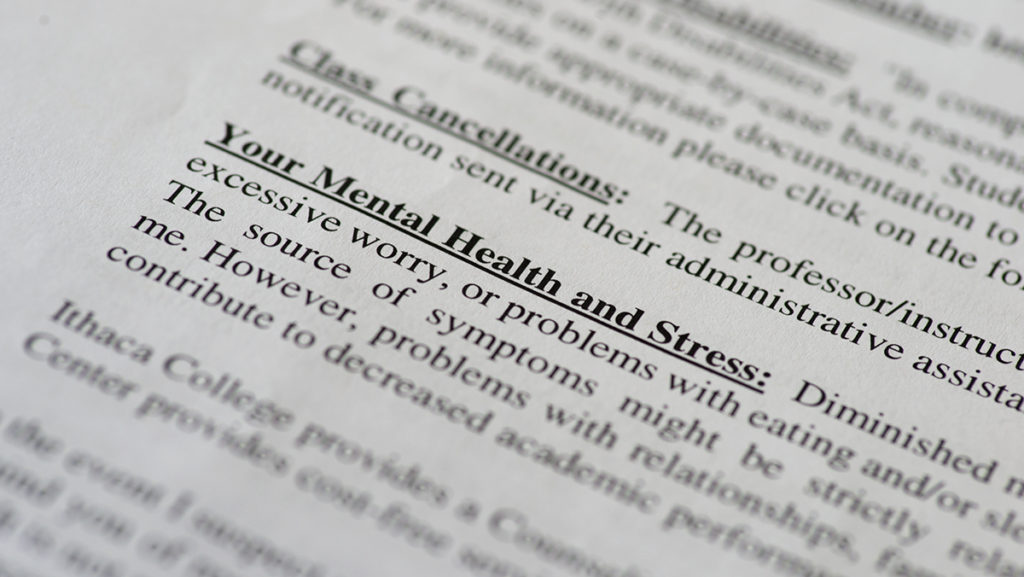Though Ithaca College does not have a collegewide policy on the matter, many faculty members provide statements on their syllabi about mental health and resources for students seeking help as demand for psychological services is increasing nationwide.
Other schools around the country have policies in place recommending professors address mental health on the syllabus. In January, Northwestern University’s Faculty Senate passed a resolution recommending professors put statements on their syllabi. Ohio State University approved a similar resolution in November. SUNY Geneseo also encourages professors to make these statements, and it even provides a statement for professors to use.
While many faculty members at the college believe this is a good suggestion, some said they are worried that making these types of statements is not enough.
There have been more students seeking help for mental health concerns recently. Last semester, the Center for Counseling and Psychological Services at Ithaca College saw a 15 percent increase in the number of students seeking counseling services, compared to in Fall 2015. The average level of counseling center usage by students nationwide increased by 30 percent from 2010 to 2015 while average enrollment grew by only 5 percent, according to the Center for Collegiate Mental Health 2015 annual report.
Most of the schools at the college already encourage their faculties to make statements about mental health in their syllabi, but none of them make it a requirement, according to the deans of each school.
Linda Petrosino, provost and vice president for educational affairs, said that while Ithaca College does not have a policy about professors putting such statements on their syllabi, faculty are free to insert whatever statements on their syllabi that they believe will be useful for their students.
James Rada, associate professor of journalism, said he has been making sure students know about mental health resources available to them for years.
“I’ve always had them in there, for over 20 years,” Rada said. “I always think any time you put info out there, the more you know, and the better off you are.”
Deborah Harper, director of CAPS at the college, said the center puts out a statement about mental health and available resources on Intercom every year, which professors can use. Harper said CAPS has been sending out these statements since 2009. Although CAPS does not keep track of how many professors actually use that statement, Harper said the Intercom post always has a large number of page views.
“We have a large number of faculty allies,” Harper said. “They know that we have students in distress, and they call and consult us.”
Harper also said many professors refer students seeking assistance to CAPS and that some professors will even walk students over to the CAPS offices themselves.
Sophomore Emma Nigrosh said she appreciates seeing a statement about mental health on the syllabus.
“I think it’s really helpful for students to see mental health statements on the syllabus because mental health and mental illness go hand in hand with education,” Nigrosh said. “College is extremely stressful, and to see a professor go out of their way to put mental health statements on syllabi is really comforting.”
Nigrosh also said it should be required for professors to include mental health statements because doing so not only helps students who are struggling with mental health issues, but it also helps bridge the gap between professors and students and makes professors seem more accessible.
However, for some, putting a statement about mental health on the syllabus is not enough. Katherine Cohen-Filipic, assistant professor of sociology who specializes in mental health, said she fears the syllabus is not the most effective place to communicate about the issue because many students often ignore most of what is on the syllabus.
“I’m not sure how good a job it does on its own,” Cohen-Filipic said. “The conversation shouldn’t stop on just the syllabus. A brief statement about it on the first day of class would be better.”
Sophomore Alaina Richey said she would also like to see professors do more for their students than just include a simple statement on the syllabus.
“I do think it’s good for students to see the mental health statements on the syllabus; however, I don’t think it is upheld by faculty,” Richey said. “In my experience, some professors aren’t very understanding when it comes to mental health.”
She also said that she would like to see professors be more open to helping students seek help with mental health issues and to not be skeptical of students if they come to them with mental health concerns.
Cohen-Filipic said she believes making a mental health statement on the syllabus mandatory would lead some professors to think that it would be enough to put resources on the syllabus and not mention it in class at all.
“People are often looking for quick solutions to big problems,” Cohen-Filipic said.
Harper also said she was uneasy about making such a statement mandatory, saying that it would be too hard to enforce and that she does not really view it as necessary.
“I would like to see a campus community that’s caring and informed about how to help,” Harper said. “It’s great that we have faculty who are willing to help.”
Rada said helping students get the assistance they need is a priority.
“A lot of students aren’t aware of resources available to them — that’s the big one,” Rada said. “Once you bring up that there’s resources available, that’s important.”








